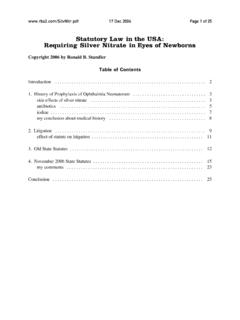Transcription of Annotated Legal Cases Involving Right-to-Die in …
1 Jul 2012 Page 1 of 157 Annotated Legal Cases InvolvingRight-to-Die in the USAC opyright 2005, 2012 by Ronald B. Standlerno claim of copyright for works of the Governmentno claim of copyright for text of judicial opinions or other quotationsKeywordsBouvia, Colyer, Conroy, Cruzan, Eichner, Fox, Quinlan, Schiavo, Storar, Terri,Theresa, court, courts, death, die, dying, extraordinary, law, Legal , life-support,life-sustaining, persistent vegetative state, treatment, United States, , ,withdraw, withholdTable of ContentsIntroduction.
2 3 Overview of the Law .. 5initial injury/disease is proximate cause of death .. 7cites to criminal Cases .. 7cites to Right-to-Die Cases .. 9advance directives .. 11physician-assisted suicide .. 13 Quinlan .. 13medical facts .. 13trial court .. 16 New Jersey Supreme Court .. 21 Brother Fox .. 32medical facts .. 32trial court .. 33first appeal .. 42 New York Court of Appeals .. 50 Colyer .. 53medical facts .. 53 Washington Supreme Court.
3 53 Conroy .. 61medical facts .. 61trial court .. Jul 2012 Page 2 of 157first appeal .. 65 New Jersey Supreme Court .. 65 Bouvia .. 84medical facts .. 84trial court .. 86appellate court .. 86concurring opinion .. 92further history .. 93similar Cases .. 94 Cruzan .. 95medical facts .. 96trial court .. 97 Missouri Supreme Court .. Supreme Court .. 116 Justice Brennan s dissent .. 123 Justice Stevens dissent .. 137remand to trial court.
4 140 Theresa Schiavo .. 140medical facts .. 141initial group of Cases .. 142 Florida Statute .. 143more litigation in Florida .. Statute .. Statute Unconstitutional .. 149autopsy .. 152excessive litigation .. 153 More Information .. 155 Conclusion .. Jul 2012 Page 3 of 157 IntroductionAs a matter of well-established law, a mentally competent adult patient has the Legal right torefuse continuing medical treatment, even if that refusal will hasten his/her death, as discussed indetail in my essay at.
5 The present essay contains Annotated quotations from the major reported Cases in the USA onthe Legal right of a patient to refuse medical care when the patient is either (1) unable to expresshis/her choice ( , patient in a persistent vegetative state) or (2) physically unable to disconnecttheir feeding tube or ventilator that keeps them alive ( , because patient is quadriplegic). Thescope of this essay is limited to patients who were mentally competent adults prior to theirinjury/illness and excludes both children, mentally retarded adults, and inmates of Cases Involving patients either (1) currently unable to express their choice or(2) physically unable to refuse medical treatment are conventionally known as Right-to-Die Cases , although that phrase is a Everyone is going to die sometime, and there isnothing that judges or physicians can do to prevent an ultimate death.
6 The real Legal issue is theright of adult patients to refuse continuing medical treatment, and thereby die sooner than theywould with continued medical list the Cases in chronological order in this essay, so the reader can easily follow the historicaldevelopment of a national am interested in this subject for two different reasons. First, I am interested in constitutionalprivacy law,2 which sets limits on the power of governments to intrude in personal choices andSecond, I am interested in the relationship between technology and change in the law.
7 Prior to the1960s, people tended to die quickly. Modern medical technology can prolong life, even when thequality of life (according to the affected individual) is not worth living. People in persistentvegetative states can live for tens of years, in a meaningless and undignified existence, andconsuming large amounts of money in health care expenses. The Legal and religious rules thatworked well prior to the 1960s are suddenly not only inadequate, but also harsh and cruel. In 1987, the New Jersey Supreme Court wrote:Death comes to everyone.
8 However, in our society, due to great advances in medicalknowledge and technology over the last few decades, death does not come suddenly orcompletely unexpectedly to most people. President's Commission for the Study of EthicalProblems in Medicine and Biomedical and Behavioral Research, Deciding to Forego Life-1 George J. Annas, The right to die in America: Sloganeering from Quinlan and Cruzan toQuill and Kevorkian, 34 DUQUESNE LAW REVIEW 875, 880 (Summer 1996).2 Ronald B. Standler, Fundamental rights Under Privacy in the USA, (Aug 1998).
9 Jul 2012 Page 4 of 157 Sustaining Treatment 15 (1983) (hereinafter President's Commission Report ).[footnote omitted] Instead, most people who die are under the treatment of health careprofessionals who are able to continue physical existence for human beings "even when mostof our physical and mental capacities have been irrevocably lost." In re Conroy, 98 321,343, 486 1209 (1985). While medical advances have made it possible to forestall andcure certain illnesses previously considered fatal, they also have prolonged the slowdeterioration and death of some patients.
10 Sophisticated life-sustaining medical technologyhas made it possible to hold some people on the threshold of death for an indeterminate periodof time, "obfuscat[ing] the use of traditional definition of death." In re Quinlan, 70 10,27, 355 647, cert. denied sub nom. Garger v. New Jersey, 429 922, 97 319,50 289 (1976). Questions of fate have thereby become matters of choice raisingprofound "moral, social, technological, philosophical, and Legal questions Involving theinterplay of many disciplines." Matter of Conroy, supra, 98 at 344, 486 1209; seePerspectives on J.










